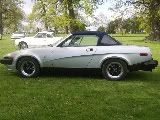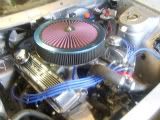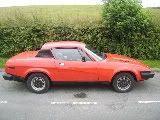I would tend to think the thermostat is not removed as if it was there would be no foot to block of the bypass there by only 50% of the coolant would ever be directed to the radiator thereby running hotter not cooler. This is counter intuitive to most cooling systems that don't have this feature, ie. my Integra when my thermostat failed and the integral spring kept it open (like it was removed)the temp gauge barely moved and I could get zero heat out of the heater, it's cooling so efficient (it was winter = +7C).
As far as the gauge taking a long time to move or read low that may not be a function of coolant temperature (only an infra red thermometer tells that) but a function of temp sensor/wiring and it's connectors corrosion/gauge reading low for a given voltage issue.
The temp of thermostat has nothing to do with the temp that the coolant runs at, it has to do with the temp the valve opens. One puts a "hotter" thermostat in in colder climes so that the coolant circulating in the engine runs hotter before being directed to the radiator so that you can get hotter air, sooner from the radiator so you can defrost the windshield, warm the interior, besides warming the oil in the engine sooner etc. important when operating at -20 degrees etc.
Hotter and cooler thermostats are fully open at normal operating temperatures and pass the same amount of coolant through the system so the operating temperature is not affected by having a having a "hotter" or "cooler" thermostat, contrary to popular belief which states "I have a cooler thermostat so my system must be running cooler". The temperature of coolant on our system is dependent on the thermostat having the "Triumph foot" so when they are open they will block off the bypass and direct all the coolant through the rad, The condition of the rad (not corroded up or blocked so there is good heat transfer), the coolant passageways in the block are not corroded or blocked so you get good heat transfer from block heat to coolant, a working water pump (very rare but possible vane pressed on shaft loose, it happened to Hasbeen). If these aren't optimal you can put a band aid on by adding a water wetter to get a temp drop. On course not enough coolant due to a leak in the system will also cause temps to rise to the point of a warped head.
While most struggle with hot temps, you are struggling with cool temps in a warmer clime I would suspect an incorrectly reading and nothing may actually be wrong with the cooling system. Infra red thermometers are cheap these days so I would check this out first as you can borrow, rent or buy one before chasing the rabbit down the garden path.
- - -TR7 Spider - - - 1978 Spitfire- - - - 1976 Spitfire - - 1988 Tercel 4X4 - Kali on Integra - 1991 Integra - Yellow TCT








